Afghanistan, social care and universal credit dominate agenda as Parliament returns
- Published
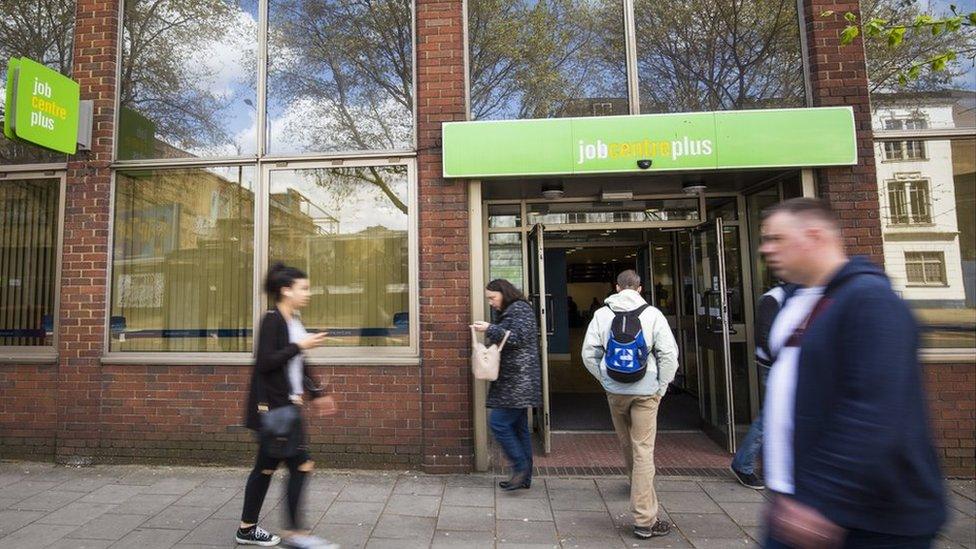
There's not much sense of new-term elation as Parliament returns to deal with the aftershocks of Afghanistan, the continuing pandemic and the painful financial dilemmas confronting the government.
Expect an early Afghanistan update from the prime minister - the bleak joke doing the rounds at Westminster is that this could not be delivered by either the foreign or the defence secretary because MPs wouldn't get both sides of the story.
Pandemic updates are also likely from the health secretary, and possibly from other ministers too.
One important theme will be the withdrawal of the temporary pandemic £20 per week uplift to universal credit - worth over £1,000 a year to claimants, at an annual cost nudging £6bn.
This is set to take effect on 6 October and it will happen automatically, without the need for a vote in Parliament.
But that is not to say that a vote won't occur.
Labour has promised to "look at any route we can to give Conservative MPs the choice to either stand up for their constituents or help Boris Johnson inflict this devastating cut on of millions of families".
And, as luck would have it, a debate where Labour can decide the subject is scheduled for Wednesday, so it's a fair bet that at least part of the day will be devoted to this issue.
In fact it looks like the running theme for Wednesday, with the Work and Pensions Committee due to hold a hearing on the impact of ending the top-up.
The backbeat to that debate will be the huge demands on the public purse coming from all quarters - calls for £10bn more for the NHS to deal with the continuing pandemic and catch-up on postponed treatments, calls for billions more for schools, and the prospect of a post-Afghanistan rethink of the UK's defence needs, which will doubtless carry a substantial price tag, too.
There's talk of an announcement of a National Insurance rise to fund social care, in the coming week, if agreement within government can be nailed down, and the Chancellor is due to announce the conclusions of the government's latest Spending Review in the coming weeks.
So every spending lobby is making its pitch for more dosh, or at least exemption from the general belt-tightening, and they can't all get what they want.
Here's my rundown of the week ahead:
Monday 6 September
The Commons reconvenes (14:30) with an hour of Education questions.
That looks pretty certain to be followed by a number of post-recess statements and urgent questions - headed by, in all probability, a statement from the prime minister on the latest on Afghanistan.
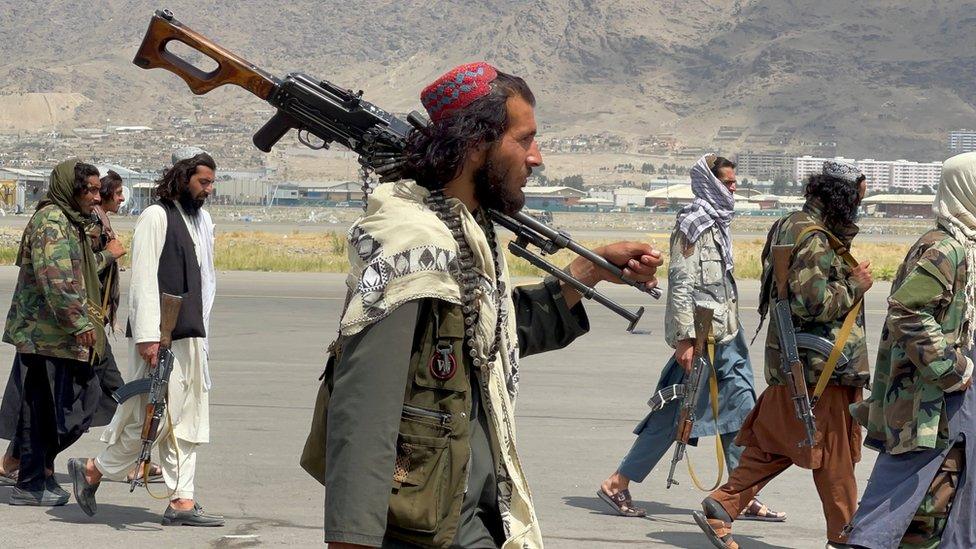
Taliban soldiers at Kabul airport
As ever, the tell-tale sign here is that the day's main business, the remaining stages of the National Insurance Contributions Bill, a humdrum technical measure, do not look particularly contentious, leaving plenty of scope for other business to be added to the agenda.
Finally the Lib Dem Christine Jardine has an adjournment debate highlighting the cost to patients of medical cannabis - some are paying as much as £1,000 a month.
She will be calling on the government to complete the process of legalisation begun three years ago, so that cannabis oil can be used medically.
In the Lords (14:30) questions to ministers range across the security situation in Afghanistan, improving pay and training for staff at social care homes, and a moratorium on deep sea mining.
Then, peers have their first four days of report stage debate on the detail of the Environment Bill, external, with plenty of votes expected.
This is a crucial moment for this major piece of legislation, which replaces the EU's environmental regulations with a new UK framework.
All kinds of peers want to on bolt new provisions on issues protecting ancient monuments to the use of disposable nappies.
Votes look likely on a Lib Dem amendment to declare a climate emergency, and on Labour amendments on clean air and plastics reduction.
There's a particularly important government amendment, from the minister Lord Goldsmith, which requires the Environment Secretary (and equivalents in the devolved governments), to be satisfied that the proposed species abundance target for 2030 would halt a decline in the abundance of species.
Green groups fear this falls short of the promised "legally binding target for species abundance for 2030, aiming to halt the decline of nature" but a vote on this particular issue looks unlikely.
Watch out for the short dinner time debate, which addresses the way the House of Lords is set up.
Tuesday 7 September
The Commons day begins (11:30) with Treasury Questions.
The day's Ten Minute Rule Bill, from Labour MP Charlotte Nichols, is the Transport (Disabled Passenger Charter) Bill which would set out the legal obligations of public transport operators towards passengers with disabilities.
Then comes the first debate on the Elections Bill, under which voters will be required to show photographic identification before collecting their ballot paper at a polling station - a rule which already applies in Northern Ireland.
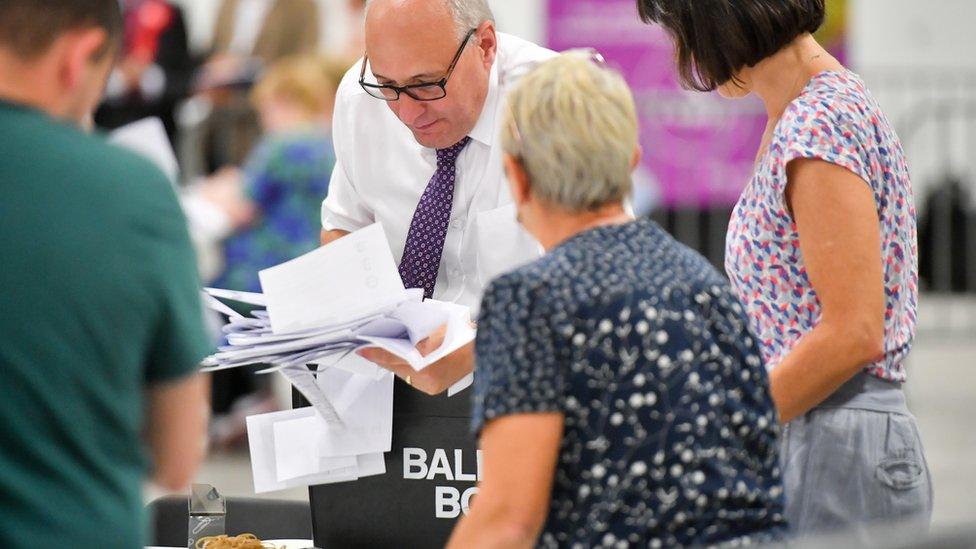
Ballots being counted in Sheffield
The bill will require long-term postal voters to re-apply every three years, and bans political campaigners from handling postal votes.
It will also scrap the 15 year limit on overseas electors' right to vote in UK. Senior Conservative David Davis has been tweeting his opposition to the voter ID proposal.
In Westminster Hall (09:25) the Conservative Ben Bradley, now double hatted as the leader of Nottinghamshire County Council, leads a debate on the economy of the East Midlands.
Committee action includes Public Administration and Constitutional Affairs (09:00) taking expert evidence on the government's Elections Bill, and Defence (14:00) quizzes industry experts, in its new inquiry into Space Defence.
In the Lords (14:30) there's a question on protecting women and girls in Afghanistan, before peers move on to the initial debate on the Armed Forces Bill - which renews the legal basis for the military and places the promises of the Armed Forces Covenant into law.
It also aims to prevent service personnel and veterans being disadvantaged when accessing healthcare, education and housing.
Familiar issues concerning the repeat investigations of service personnel and veterans, and the treatment of Ghurkhas will resurface.
Wednesday 8 September
The Commons begins (11:30) with half an hour of Scotland questions, followed at noon by Prime Minister's Question Time.
The main debate will be on a Labour motion or motions, yet to be announced - but see above.
In Westminster Hall, my eye was caught by the debate on the co-operative purchase of companies by employee groups at risk of redundancy (11:00) led by the Labour (and Co-Op) MP Christina Rees and the Lib Dem Layla Moran's debate on (14:30) on ending rough sleeping.
What about committees? Well, the Work and Pensions Committee (09:30) has a session on the DWP's response to the coronavirus outbreak, which looks certain to focus on the impending withdrawal of the top up to universal credit payments.
Elsewhere, Transport (09:30) hears evidence on the safety, regulation and environmental impact of jet skis; and Human Rights (15:00) continue their scrutiny of the Nationality and Borders Bill.
In the Lords (15:00) there are questions of the qualifications of non-executive directors appointed to government departments, and on retaining nurses in the NHS, post-pandemic.
The main event is the second day of detailed consideration on the Environment Bill where the key votes look likely to be on proposals to beef up the proposed Office for Environmental Protection.
Former chair of the Food Standards agency, Lord Krebs wants guarantees on its independence, while Lord Anderson, a former reviewer of terror legislation, has an amendment on tougher enforcement power.
Both seem likely to be pushed to a vote.
Thursday 9 September
The Commons opens (09:30) with Transport questions which will be followed by the regular statement on the forthcoming agenda for the week ahead.
Then MPs polish of the last stages of consideration for the Rating (Coronavirus) and Directors Disqualification (Dissolved Companies) Bill, before turning to a backbench debate on the legacy of the murdered MP Jo Cox.
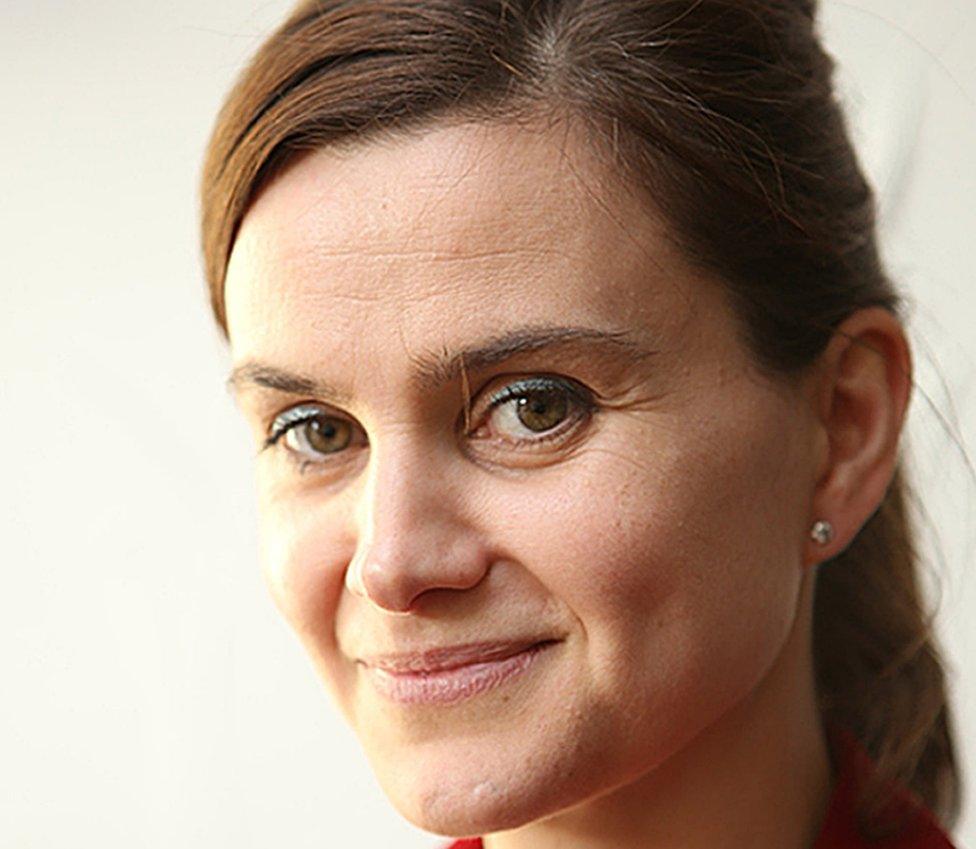
Jo Cox was the Labour MP for Batley and Spen
In the adjournment debate, the Conservative ex-minister Sir Mike Penning will discuss creating an Emergency Services Cenotaph in Whitehall.
Committee action includes Public Accounts (10:00) looking at one of their hardy perennials: fraud and error in the benefits system.
Top officials from the Department for Work And Pensions, and Digital, Culture, Media and Sport (10:00) will hold a pre-appointment hearing with John Edwards, the government's preferred candidate for Information Commissioner.
In the Lords (11:00) peers question ministers on bringing the English planning system and building regulations into line with the net zero commitment, and on reducing red tape for UK musicians performing in the EU.
The main debates are on subjects chosen by backbench Labour peers.
First, the former home secretary, Lord Blunkett, leads on standards in public life expected to be a round-up of ethics accusations against ministers and the PM.
Then the former High Commissioner to South Africa, Lord Boateng, leads on providing COVID vaccinations to the global South.
There's also a short debate led by the Lib Dem, Lady Tyler, on the withdrawal of the £20 top-up to universal credit.
Friday 10 September
The Private Members Bill, external season opens in the Commons (09:30) with the ballot-winner, the Conservative, Mark Jenkinson, presenting his Education (Careers Guidance in Schools) Bill for its first debate.
The bill, which has government support, extends the availability of careers guidance to children in year 7 (it currently starts in Year 8 for 12-year-olds).
Next comes another Conservative, Peter Gibson, with debate of his Taxis and Private Hire Vehicles (Safeguarding and Road Safety) Bill which aims to ensure that passengers are protected from unsuitable drivers who shouldn't be driving.
And if there's time, the Treasury Committee Chair and former minister Mel Stride has the debate for his Cultural Objects (Protection from Seizure) Bill - which seeks to extend the protection where ownership of an object, of example in a museum, is contested.
Bills further down the agenda seldom have much chance of being debated - but it's possible that some could be sent forward for consideration in detail, if no-one objects at the close of business at 14:30.
Maybe Sarah Atherton's Miniature Mobile Phones (Prohibition of Sale) Bill might receive a formal debate by this means?
The mobile phones her bill is aimed at can be smuggled into prisons where they are a key factor in drug dealing and allow serious organised criminals to operate from behind bars.
The Lords has its own helping of Private Members Bills (10:00). First up is the debate of the Labour peer and barrister Lord Hendy's Status of Workers Bill.
This aims end "gig economy" working arrangements in sectors like care work and hospitality that leave millions of people without a regular wage and without rights to sick pay, paid parental leave, and the right to take their employer to court if they are unfairly dismissed.
Second is the Lib Dem Baroness Burt of Solihull's Education (Assemblies) Bill, which would replace compulsory religious worship in English schools with inclusive assemblies.
That is followed by the Lib Dem Baroness Ludford's Refugees (Family Reunion) Bill, which would expand the UK's current family reunion rules so that child refugees can bring their parents and siblings to join them in the UK.
It would also allow refugees to be joined by their dependent children over 18.
Related topics
- Published30 August 2021
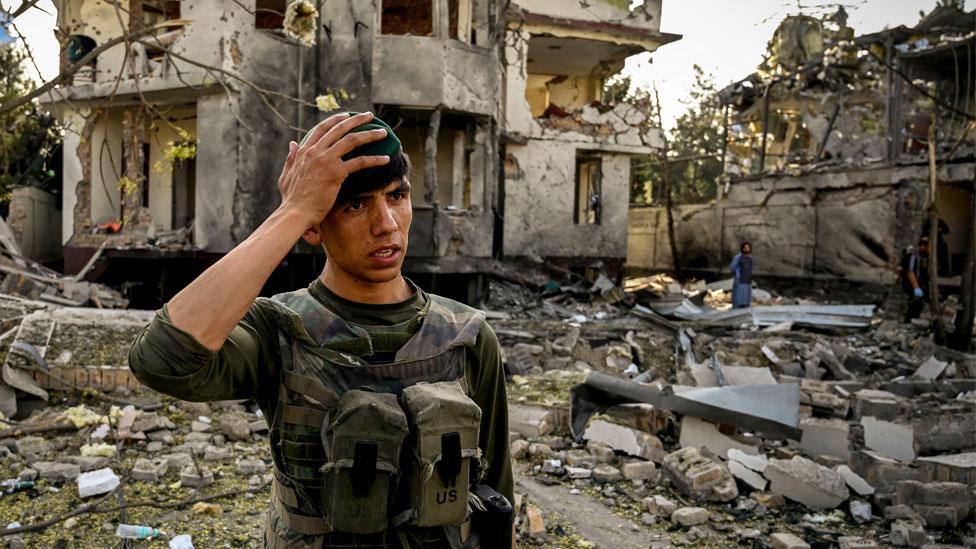
- Published13 May 2024

- Published15 October 2019

